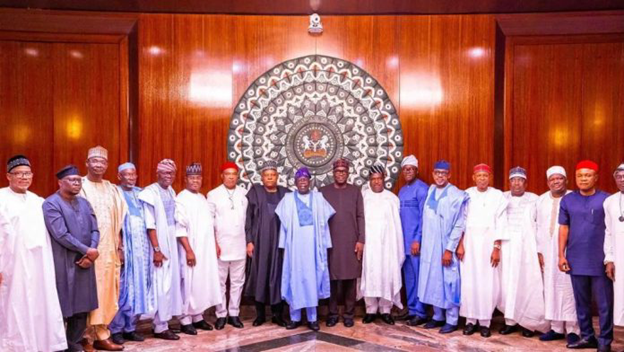A fresh battle over local government (LG) autonomy is brewing as state governors lobby President Bola Tinubu to block the direct disbursement of federal allocations to local councils. This renewed resistance comes despite a Supreme Court ruling mandating that LG funds bypass state governments and go straight into council accounts.
Last Tuesday, several state governors met with Tinubu at the Presidential Villa in Abuja. They used the opportunity to pressure him into reconsidering the plan to have LG funds deposited in the Central Bank of Nigeria (CBN). Instead, they want the allocations sent to commercial banks, arguing that federal oversight through the CBN would still place the money under Abuja’s control.
One insider at the meeting disclosed that the governors fear losing influence over local governments if the funds go directly to them. “If the money is in CBN accounts, it means the Accountant-General must approve withdrawals. That gives the federal government control, and the governors don’t want that,” the source said.
The Supreme Court’s July 2024 ruling had delivered a strong message: state governments should no longer receive and distribute LG allocations. The ruling also declared that only democratically elected local government officials could access federal funds, putting an end to the widespread practice of governors appointing caretaker committees to run councils.
While the Supreme Court verdict was clear, implementation has been slow. Nine months after the ruling, LG allocations remain in limbo. Governors cite multi-billion-dollar debts allegedly incurred by LGs under their watch as a major concern. They argue that sudden financial autonomy for local councils could complicate the repayment process. In other news, iNaijanow recently shared a post on the price war between Dangote refinery and NNPC.
“The governors claim that local governments owe billions of dollars, and this needs to be sorted out first,” said Mohammed Abubakar, Secretary-General of the Association of Local Governments of Nigeria (ALGON). He warned that if the Supreme Court ruling is implemented hastily, LG funds could end up settling debts that councils never knew existed.
The CBN, meanwhile, has imposed new conditions before it will release funds. It now requires all 774 LGs to submit a two-year account audit before accounts are opened. The apex bank has also been slow to provide clear guidelines for local government officials on how to access funds.
“There’s confusion,” Abubakar added. “LG chairmen don’t even know where to go in the CBN to open their accounts. The process needs clarity.”
Some stakeholders worry that local governments might not be better off even if they receive direct allocations. The National Union of Local Government Employees (NULGE) has warned that governors might still find ways to interfere. Meanwhile, ALGON has raised concerns about court orders and rulings that could lead to massive deductions from LG funds.
“There are multiple lawsuits against local governments, with consultants claiming billions. If the money hits CBN accounts, creditors might swoop in,” Abubakar explained.
President Tinubu has so far taken a diplomatic stance. In January, he assured governors that there was no conflict over LG autonomy. He urged cooperation, saying, “Nobody wants to take them away from you, but we need collaboration.” However, with mounting pressure from governors and legal complexities surrounding LG debts, his administration faces a tough decision.
Stakeholders like ALGON and NULGE insist that wider consultations are needed before moving forward. “We need everyone at the table, local government officials, legal experts, the finance ministry, and even the governors. Without proper dialogue, this autonomy push could create more problems than it solves,” Abubakar warned.
As political and financial interests collide, the fight over local government funds is far from over. LGs remain in a financial limbo, waiting for the federal government to turn the Supreme Court ruling into reality.
















